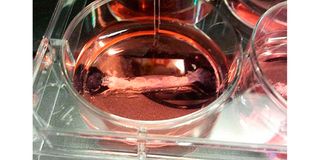‘Growing’ of meat without animals may end hunger

Lab-grown meat at Maastricht University, the Netherlands. Such ‘farming’ provides a sustainable solution to the unparalleled challenge of climate change.
What you need to know:
- Several companies are doing it; in Singapore, a lab-grown chicken nugget is in the market.
- That way, a product with enhanced nutrients that is tasty and nutritious, at a reasonable and potentially lower cost than if produced conventionally, can be produced.
- Such ‘farming’ provides a sustainable solution to the unparalleled challenge of climate change.
In his 1931 essay “Fifty Years Hence”, Sir Winston Churchill wrote: “We shall escape the absurdity of growing a whole chicken in order to eat the breast or wing, by growing these parts separately under a suitable medium.” He said they will be practically indistinguishable from natural foods.
Earlier, in 1894, then-famed French chemistry professor Pierre-Eugene Marcellin Berthelot had claimed that by 2000 humans would feast on meat grown in a lab rather than from slaughtered animals.
The two great men advanced the idea that this would be the way to go if the technology proved cheaper and better to make than grow the products.
Over time, through innovative and intense research and development, the idea has become reality through cellular agriculture—production of cell-based meat and seafood or, if you will, animal-free meat.
Several companies are doing it; in Singapore, a lab-grown chicken nugget is in the market.
This is growing foods such as real animal meat and other animal products in a lab while leaving the animals alone and, perhaps, returning huge swaths of cropland back to their more natural habitats.
It simply involves taking a tiny biopsy of an animal’s muscle, culturing the cells in the lab and growing from the molecule up in a bioreactor real milk, eggs, leather and gelatin identical to the ‘real’ animal products.
Advancement in modern biotechnology presents an unprecedented opportunity to develop cell lines that allow chemical and biological processes to generate and accumulate more bioavailable nutrients.
That way, a product with enhanced nutrients that is tasty and nutritious, at a reasonable and potentially lower cost than if produced conventionally, can be produced.
This is not science fiction but real science!
Such ‘farming’ provides a sustainable solution to the unparalleled challenge of climate change.
A deliberate effort has seen man shift from the spear to the seed, domesticating animals and plants in a veritable agricultural and industrial revolution.
Animal farming is one of the major causes of global warming, with the UN comparing its greenhouse gas emissions to those of the entire transportation sector.
Even beyond climate change, it faced challenges of scarce land and other resources to support large numbers to feed the ever-explosive population.
Regulatory frameworks
Just as we need clean energy to replace fossil fuels, we may need ‘clean’ meat to replace animal meats.
In a study published in the Journal of Environmental Science and Technology by Prof Hamu Tamisto, cultured beef could require up to 45 per cent less energy, 99 per cent less land and 96 per cent less water than conventionally realised. Imagine a single cell producing billions of tonnes of beef products!
Food safety authorities, academia and other stakeholders should craft regulatory frameworks.
The risk analysis process should consider all the upstream and downstream processes and analyse and characterise all hazards, recommend control measures, monitor inputs and set environmental monitoring programmes for food safety assurance.
That should form the scientific basis for developing standards, and any specifications to guide the development, importation from other economies and placement in the market for consumption.
Several countries are making these products. The ethical dilemma is, can a food grown from chicken cells as the main ingredient be also called chicken?
Dr Karau is the director, quality assurance and Inspection, at Kenya Bureau of Standards (Kebs). [email protected].





